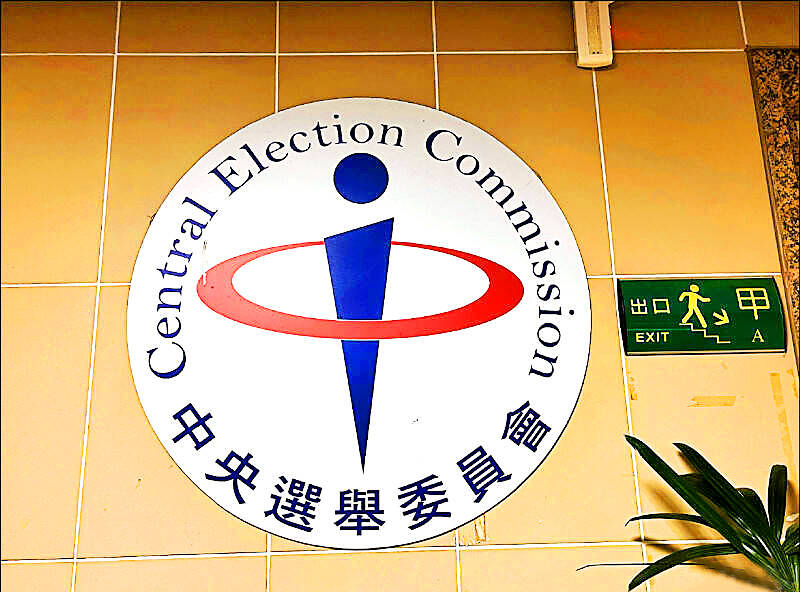Detailed figures from the nine recall vote proposals supported by the Chinese Nationalist Party (KMT) showed that they contained nearly 1,000 signatures of people who are deceased, the Central Election Commission (CEC) said.
The commission on Thursday said that the recall vote proposals for 19 KMT legislators were approved, while another nine proposals seeking to recall Democratic Progressive Party (DPP) lawmakers have “not yet met the proposal threshold” and require supplementation before they can be approved.
Collected signatures reviewed by the commission’s local branches showed that the nine recall proposals for DPP lawmakers Su Chiao-hui (蘇巧慧), Chang Hung-lu (張宏陸), Tsai Chi-chang (蔡其昌), Ho Hsin-chun (何欣純), Chen Kuan-ting (陳冠廷), Wu Li-hua (伍麗華), Lee Kun-cheng (李坤城), Lee Chun-hsien (李俊憲) and Wang Ting-yu (王定宇) failed to meet the signature threshold required for the first stage, with 986 signatures founded to be from people already deceased, and more than 600 signatures that were repeated.

Photo: Taipei Times file photo
Commenting on the matter, former KMT vice presidential candidate Jaw Shaw-kong (趙少康) on Facebook on Friday said he has “never seen such a weak opposition party.”
The dismal performance has affected the party’s image and disappointed its supporters, he said.
The DPP is leveraging its advantage as the ruling party in the recall campaign, yet the KMT is not matching the DPP’s efforts, he added.
Jaw said the KMT was being too mentally defense-oriented and called on the party to turn in sufficient signatures for the proposals if it did not wish to become the butt of DPP jokes.
Responding to Jaw’s criticism, KMT Chairman Eric Chu (朱立倫) yesterday said that the party supported the efforts of volunteers during the signature drive despite the commission’s stricter-than-normal review processes.
Chu said the commission is playing favorites, as it has not made an issue out of invalid signatures for proposals to recall KMT legislators.
Such double standards are why the KMT wishes to propose amendments to the Public Officials Election and Recall Act (公職人員選舉罷免法) to mandate that all signatures be accompanied by a photocopy of the signatory’s national identification card, he said.
DPP Secretary-General Lin Yu-chang (林右昌) yesterday said that the high percentage of invalid signatures provided by the proposals seeking to recall DPP lawmakers should be considered a violation of the public’s fundamental rights.
The KMT also runs the risk of contravening standing laws, Lin said, adding that the legality of such signature drives should be discussed further.
Lin called on local branches of the commission to launch investigations into the issue, adding that if local branches do not act, they should be investigated for dereliction of duty.
Per the act, recalls have to undergo two stages, the first being the proposal, which requires 1 percent of voters in the electorate the official represents to sign the petition.
In the second petition stage, signatures from 10 percent of voters in the electorate must be collected before a recall vote is held.
The act states that the recall vote must receive approval from one-quarter of the electorate.
Additional reporting by Huang Tzu-yang

Taiwan has received more than US$70 million in royalties as of the end of last year from developing the F-16V jet as countries worldwide purchase or upgrade to this popular model, government and military officials said on Saturday. Taiwan funded the development of the F-16V jet and ended up the sole investor as other countries withdrew from the program. Now the F-16V is increasingly popular and countries must pay Taiwan a percentage in royalties when they purchase new F-16V aircraft or upgrade older F-16 models. The next five years are expected to be the peak for these royalties, with Taiwan potentially earning

STAY IN YOUR LANE: As the US and Israel attack Iran, the ministry has warned China not to overstep by including Taiwanese citizens in its evacuation orders The Ministry of Foreign Affairs (MOFA) yesterday rebuked a statement by China’s embassy in Israel that it would evacuate Taiwanese holders of Chinese travel documents from Israel amid the latter’s escalating conflict with Iran. Tensions have risen across the Middle East in the wake of US and Israeli airstrikes on Iran beginning Saturday. China subsequently issued an evacuation notice for its citizens. In a news release, the Chinese embassy in Israel said holders of “Taiwan compatriot permits (台胞證)” issued to Taiwanese nationals by Chinese authorities for travel to China — could register for evacuation to Egypt. In Taipei, the ministry yesterday said Taiwan

‘LIKE-MINDED PARTNER’: Tako van Popta said it would be inappropriate to delay signing the deal with Taiwan because of China, adding he would promote the issue Canadian senators have stressed Taiwan’s importance for international trade and expressed enthusiasm for ensuring the Taiwan-Canada trade cooperation framework agreement is implemented this year. Representative to Canada Harry Tseng (曾厚仁) in an interview with the Central News Agency (CNA) said he was increasingly uneasy about Ottawa’s delays in signing the agreement, especially as Ottawa has warmed toward Beijing. There are “no negotiations left. Not only [is it] initialed, we have three versions of the text ready: English, French and Mandarin,” Tseng said. “That tells you how close we are to the final signature.” Tseng said that he hoped Canadian Prime Minister Mark Carney

Taiwan is awaiting official notification from the US regarding the status of the Agreement on Reciprocal Trade (ART) after the US Supreme Court ruled US President Donald Trump's global tariffs unconstitutional. Speaking to reporters before a legislative hearing today, Premier Cho Jung-tai (卓榮泰) said that Taiwan's negotiation team remains focused on ensuring that the bilateral trade deal remains intact despite the legal challenge to Trump's tariff policy. "The US has pledged to notify its trade partners once the subsequent administrative and legal processes are finalized, and that certainly includes Taiwan," Cho said when asked about opposition parties’ doubts that the ART was